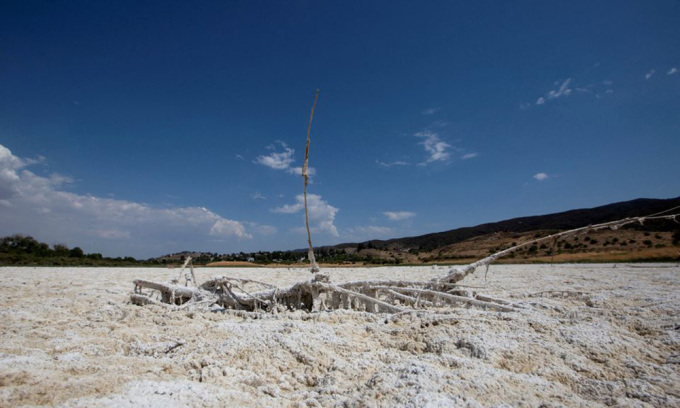Fifty-three percent of the lakes in the new study lost water at a rate of about 22 billion tons per year between 1992 and 2020.

A view of Lake Elizabeth, which has been dry for several years due to drought and extreme heat in the area, in 2021. Photo: Reuters/Aude Guerrucci
More than half of the world's large lakes have shrunk since the early 1990s, largely due to climate change, raising concerns about water resources for agriculture , hydropower and people, according to new research by an international team of experts published in the journal Science on May 18.
Some of the world’s most important freshwater sources – from the Caspian Sea between Europe and Asia to South America’s Lake Titicaca – have been losing water at a cumulative rate of about 22 billion tons a year for nearly three decades, experts say. That’s about 17 times the volume of Lake Mead, the largest reservoir in the United States.
Fifty-six percent of the decline in natural lakes is due to human consumption and climate warming, with the latter accounting for the larger share, according to Fangfang Yao, a surface hydrologist at the University of Virginia who led the study. Nearly 2 billion people live around the drying lakes and are directly affected.
Climate scientists generally assume that dry parts of the world will become drier due to climate change, while wet places will become wetter. However, new research finds that wet areas are also losing significant amounts of water.
The team used satellite measurements combined with hydrological and climate models to assess nearly 2,000 large lakes. They found that unsustainable human water use, changes in rainfall and flow patterns, sedimentation, and rising temperatures have caused global lake levels to fall. Of these, 53% declined between 1992 and 2020. Only about a quarter of the lakes studied saw their water levels rise, often due to damming in remote areas like the Qinghai-Tibet Plateau.
Scientists have long said that global warming must be kept below 1.5 degrees Celsius to avoid the most catastrophic consequences of climate change. The world is currently warming at about 1.1 degrees Celsius.
Research published on May 18 found that unsustainable human use is drying up many lakes, such as the Aral Sea in Central Asia and the Dead Sea in the Middle East. Meanwhile, lakes in Afghanistan, Egypt, and Mongolia are being affected by rising temperatures, which could lead to increased water loss to the atmosphere.
Thu Thao (According to Reuters )
Source link







































![[Photo] Parade to celebrate the 50th anniversary of Laos' National Day](/_next/image?url=https%3A%2F%2Fvphoto.vietnam.vn%2Fthumb%2F1200x675%2Fvietnam%2Fresource%2FIMAGE%2F2025%2F12%2F02%2F1764691918289_ndo_br_0-jpg.webp&w=3840&q=75)











































































Comment (0)